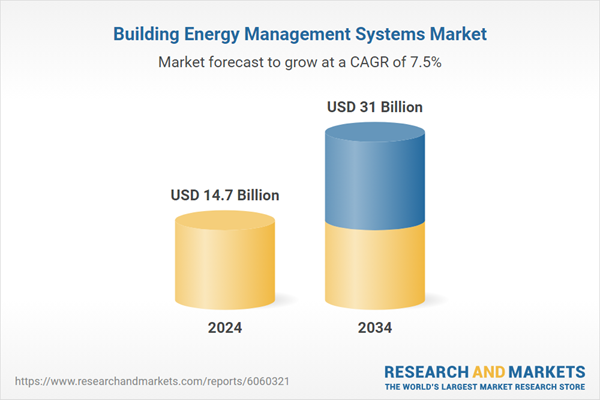With the integration of AI-driven analytics, IoT-enabled automation, and cloud-based energy optimization platforms, the market is witnessing rapid technological advancements. Companies are leveraging these innovations to improve energy utilization, enhance building performance, and meet aggressive sustainability goals. The increasing reliance on renewable energy sources, coupled with the growing emphasis on carbon footprint reduction, is further accelerating BEMS adoption. Additionally, the escalating energy costs and rising concerns over grid reliability are prompting businesses to implement robust energy monitoring systems to optimize electricity usage. Private sector investments in sustainable infrastructure and smart buildings are driving market growth as enterprises seek to achieve regulatory compliance while ensuring long-term energy efficiency.
The software segment is poised for substantial expansion, with projections indicating it will generate USD 8.5 billion by 2034. Businesses are prioritizing intelligent energy monitoring and automation to streamline operations and reduce energy wastage. Advanced software solutions equipped with real-time data analytics and AI-powered automation are revolutionizing the way organizations manage their energy needs. By optimizing energy distribution and consumption patterns, these solutions enable companies to lower costs and improve overall efficiency. With industries shifting towards digital transformation, the demand for smart energy management software continues to rise, positioning it as a key driver of market growth in the coming decade.
The power and energy sector accounted for 28% of the total market share in 2024, and its influence is expected to expand significantly in the coming years. Rapid industrialization and urbanization have led to an unprecedented surge in global energy demand, increasing the need for sophisticated energy management solutions. Organizations across the power generation and distribution sectors are making strategic investments in energy-efficient technologies to optimize resource utilization and reduce carbon emissions. The growing integration of renewable energy sources, such as solar and wind power, is further contributing to the rising adoption of BEMS solutions. As companies focus on sustainable development and energy conservation, the sector remains a crucial growth area for BEMS providers worldwide.
The US building energy management system market was valued at USD 2.9 billion in 2024 and is experiencing a notable surge in adoption. The modernization of building infrastructure, coupled with the growing emphasis on energy optimization, is driving demand across commercial and residential sectors. By 2034, the North American market is expected to generate USD 7.5 billion, fueled by increasing investments in smart building technologies. Regulatory measures, including government-backed policies and energy efficiency mandates, are shaping the industry by establishing clear standards that encourage the integration of advanced energy management systems. As companies seek to enhance operational efficiency and meet sustainability targets, the shift towards intelligent building technologies is set to propel market expansion over the next decade.
Comprehensive Market Analysis and Forecast
- Industry trends, key growth drivers, challenges, future opportunities, and regulatory landscape
- Competitive landscape with Porter’s Five Forces and PESTEL analysis
- Market size, segmentation, and regional forecasts
- In-depth company profiles, business strategies, financial insights, and SWOT analysis
This product will be delivered within 2-4 business days.
Table of Contents
Companies Mentioned
The companies featured in this Building Energy Management Systems market report include:- ABB
- C3.ai
- Dexma Sensors
- Eaton
- Emerson Electric
- ENGIE Impact
- eSight Energy
- General Electric
- GridPoint
- Honeywell
- IBM
- Ingersoll Rand
- Johnson Controls
- Mitsubishi Heavy Industries
- NX Technologies
- Optimum Energy
- Rockwell Automation
- Schneider Electric
- Siemens
- SkyFoundry
- Telkonet
- Toshiba
Table Information
| Report Attribute | Details |
|---|---|
| No. of Pages | 100 |
| Published | February 2025 |
| Forecast Period | 2024 - 2034 |
| Estimated Market Value ( USD | $ 14.7 Billion |
| Forecasted Market Value ( USD | $ 31 Billion |
| Compound Annual Growth Rate | 7.5% |
| Regions Covered | Global |
| No. of Companies Mentioned | 23 |









